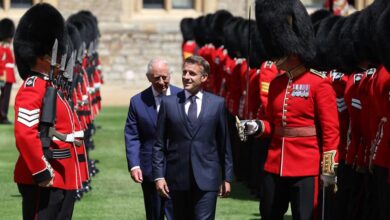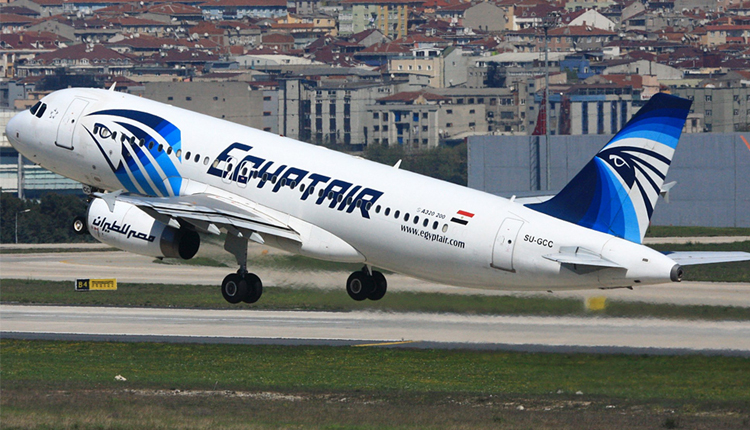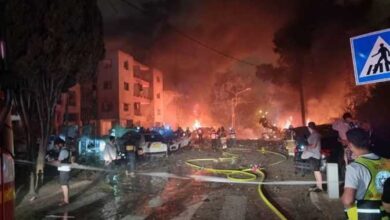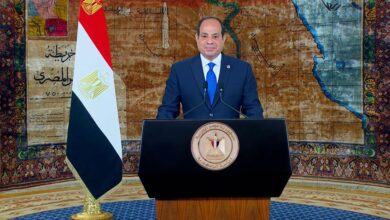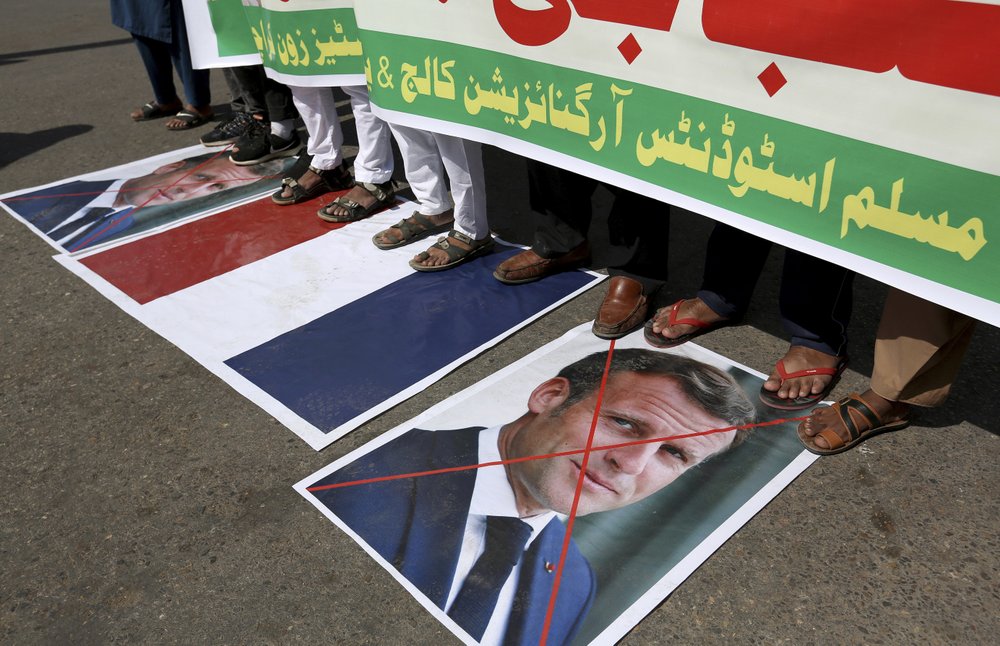
Did Macron catch the vicious “bug” of sectarianism from Lebanese officials when he met them in Beirut? They know how to back away from sectarianism. So, is there anyone who can get Macron away from it too?
“We will not give up cartoons,” Macron vowed, commenting on the cartoons insulting Prophet Muhammad (PBUH), which, after the rage they caused in 2015, Charlie Hebdo republished.
Was Macron aiming to cause a storm that would divert attention away from the ongoing debate over the crisis that France is facing as a result of the return of the yellow vest protest against his administration?
Considering his statement of what he called “Islam is in crisis”—Is the French president serious about implementing his plan to confront Islamic radicalism, while intentionally or unintentionally, thinking that “Islam is a religion that is in crisis globally?”
If he had said that “Muslims” rather than “Islam” are in a crisis, he would not have caused such a storm. Did he fall into the trap of terms, with his words betraying him? Or did he join the Islamophobic ranks, along with both far-right supporters and radical secularists that are hostile to all religions, including Islam?
What could we call the repeated clash between France and the Muslims of the world, and why does it happen?
At the heart of this clash is “political Islam”, which we should first define in simple terms.
Wikipedia defines political Islam as: “a term that appeared recently due to the isolation of the sacred poles in the Islamic world from politics, a source of political identity and action. It can refer to a wide range of individuals or groups who advocate the formation of state and society according to their understanding of Islamic principles. It may also refer to the use of Islam as a source of political positions and concepts.”
In this sense, political Islam, especially as described in the second part of Wikipedia’s definition, has been present in the literature of Arab renaissance and among some of its thinkers since the mid-19th century. Whether we agree with this definition or not, it is, in fact, an opinion and an attitude that anyone may adopt and promote.
However, the internal dilemma of political Islam lies in its inherent association with terrorism and use of violence and force, the justification of which required “takfir” or the ex-communication of societies. Many Muslims, including thinkers and religious scholars known for their faith and piety, reject this approach.
This association with violence further exacerbates the problem of Islam’s relationship with the West, the causes of which can be summed as promoting rhetoric against Western civilization and rejecting European values that the West made sacrifices to obtain.
For this reason, France and the rest of the European countries that have established democratic, pluralistic societies, may consider political Islam a threat.
European leaders, thinkers, and politicians are not concerned because they reject Islam, nor because they are “secret members” in a “grand global plan to eliminate Islam,” as imagined by many Arab and Muslim conspiracy theorists, many of whom are, sadly, officials and thinkers.
Instead, they monitor political Islam closely and worriedly because it poses a growing danger.
The danger is a result of the increasing number of Muslim immigrants and other factors that Macron mentioned in his speech, including the failure to integrate immigrants in their new societies and the delay in addressing their social and economic issues. These factors contribute to the recruitment of these migrants by political Islam.
Additionally, there are other factors that no European leader would speak about, such as the Western prejudice against Muslim immigrants, which denies them equal opportunities, and paints them as suspicious characters.
This phenomenon has been growing since the beginning of the western world’s anti-terror campaign after the 2001 9/11 attacks.
Following the great uproar his speech provoked and the subsequent call to boycott French products, Macron made a media appearance to explain to Muslims what he meant: “I want to say that, contrary to what I’ve heard during the last couple of days, our country has no problem with any religion in the world, here, all religions are freely practiced, for French Muslims, and Muslim citizens around the world” and added, “ I want to say to them that France is a country where this religion is practiced freely and where there is no stigmatization, everything that I’ve heard is quite wrong.”
When asked to clarify the statement “we will not give up the cartoons”, the French President said: “Thank you for mentioning it, there were many translations, in the Arab world media, and I also saw them on fake social media. For example, they distorted my words, claiming that I said I support the humiliating caricatures made of the prophet. I never said anything like that. Firstly, because these caricatures are about all religions, there are no caricatures that are directed at one religion but not the other. Also, they are affecting all political leaders; Secondly, “I said is that I was protecting their rights because that is my role. I also believe that in our society we must accept and accomplish respect for one another”.
Macron was straightforward; he did not offer apologies to appease the clamor of the protesters, nor did he give a neat speech suggesting a desire to elude what is happening. Rather, he openly said, “I am not here to set up a moral order in society or to redefine freedom in the Fifth Republic for the sake of any religion. My job is to protect the constitution and the law”
Shuffling the cards by some media outlets, political and religious leaders have considered these cartoons a projection of the French government or president’s views.
Critically thinking, this is a false judgment that must be put in context; Macron is a public servant who works to protect the rights of his people, thus, when he preserves the right of a citizen, perhaps he disagrees with him or her, but he nevertheless fulfills his duty.
Macron’s political correctness shone when he said, “Terrorism carried out in the name of Islam is a scourge for all Muslims.” And added that: “Most victims of this terrorism committed in the name of Islam are Muslims, this terrorism hit us on our land.”
He additionally pointed out that his struggle against radical Islam and its violent extremists is not a fight against Islam.
Once again, angry Muslims have fallen into the trap of what social psychology calls “Mainstream Thinking.” Humans are social by nature and don’t desire individualism, nor to stand-alone against the majority. Thus, they agree to whatever the group dictates while feeling relaxed and reassured in their comfort zones, unwilling to give up the herd’s approval.
The policy of opposition frightens and worries them, making them uncomfortable with the idea of staying out of the flock that got upset and decided to wage jihad against cheese! Now, the flock no longer wants France’s cheese, perfumes, or luxurious clothes, and if it were up to them, they would say we don’t need its planes either!
On this subject, a problematic question should be raised: when do we lose our independence of expression and become subject to some authority or power? And when do we maintain our free opinion, and think critically about what is happening?
Gabriel García Márquez says “A man reaches maturity when he realizes his father’s faults, and reach old age when he begins to look like him.” This means, you will reach a point in which you can define your father’s faults, who was your childhood idol. Yet, this does not reduce your love for him; rather, you are only practicing critical thinking.
And here is what we need to do: avoid simplistic, one-sided beliefs based on “violence against the opposite other” and asserting that everything that happens is right. We should subject every rhetoric, albeit collective, to critical thinking, regardless of its reliability. As long as the world is changing rapidly, the principles and values of people will be in constant change. Most of us dealt with our identity in a secure, one-sided manner, similar to a shell. At the same time, we should consider Islam as an open, pluralistic identity, rather than a selective one.
Is Islam in crisis? Is it an isolationist, supremacist, separatist ideology that yields terrorism with religious groups?
Or are the supporters of “political Islam” calling for a closed ideology that includes a predetermined view of man and the other, advocated by people who do not want to separate political power and spiritual power?
Some Muslims still take religion out of context and do not acknowledge the separation of the spiritual and ideological side not from the social side only, but also from the political theory which they disagree on as well. This explains the permanent clash, not only between Muslims and France but between them and all countries that adopt secularism.
Photo: Supporters of the Muslims Students Organization stand on a representation of a French national flag and defaced images of French President Emmanuel Macron during a protest against the president and against the publishing of caricatures of the Prophet Muhammad they deem blasphemous, in Karachi, Pakistan, Friday, October 30, 2020. Muslims have been calling for both protests and a boycott of French goods in response to France’s stance on caricatures of Islam’s most revered prophet. (AP Photo/Fareed Khan)

